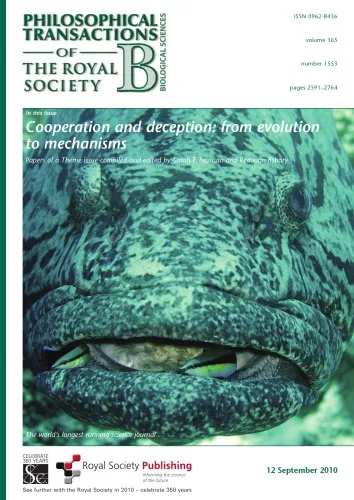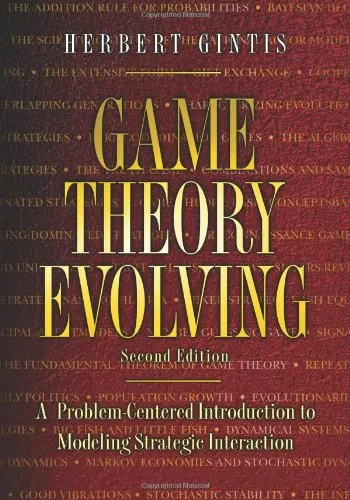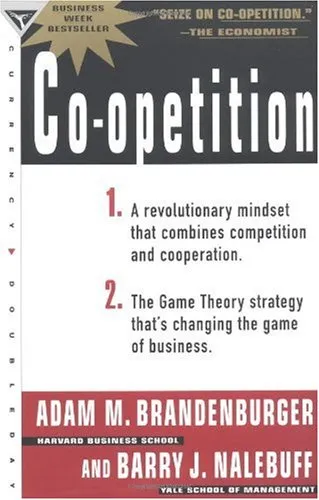Cooperation and Deception: From Evolution to Mechanisms (Philosophical Transactions of the Royal Society series B)
4.5
بر اساس نظر کاربران

شما میتونید سوالاتتون در باره کتاب رو از هوش مصنوعیش بعد از ورود بپرسید
هر دانلود یا پرسش از هوش مصنوعی 2 امتیاز لازم دارد، برای بدست آوردن امتیاز رایگان، به صفحه ی راهنمای امتیازات سر بزنید و یک سری کار ارزشمند انجام بدینکتاب های مرتبط:
معرفی کتاب "Cooperation and Deception: From Evolution to Mechanisms"
کتاب Cooperation and Deception: From Evolution to Mechanisms یکی از آثار برجسته علمی در درک عمیق روابط اجتماعی بین موجودات زنده است. این کتاب که توسط سارا اف. بروزنان و رودوان بشری ویرایش شده است، به بررسی مفاهیمی چون همکاری (Cooperation) و فریب (Deception) در طیف وسیع موجودات زنده میپردازد. این اثر، که در سری معتبر Philosophical Transactions of the Royal Society B منتشر شده، به دنبال تبیین ریشههای تکاملی و سازوکارهای زیربنایی این رفتارها است.
خلاصهای جامع از کتاب
این کتاب مجموعهای از مقالات پژوهشی پیشرفته را گردآوری کرده است که به بررسی عمیق همکاری و فریب در طبیعت میپردازند. موضوعات این کتاب شامل چگونگی تکامل همکاری در گونههای اجتماعی، نقش هزینهها و منافع در شکلگیری روابط، و سازوکارهای شناختی و عصبی که چنین رفتارهایی را ممکن میکنند، میباشد. کتاب به دو بخش اصلی تقسیم میشود:
- تکامل همکاری و فریب: در این بخش، نویسندگان به بررسی فرآیندهای تکاملی که منجر به ظهور رفتارهای همکاری و فریب شدهاند، میپردازند.
- سازوکارهای زیرساختی و شناختی: در این بخش، مطالعات شناختی و عصبی در مورد رفتارهای همکاری و فریب بررسی میشوند.
نکات کلیدی کتاب
- همکاری و فریب به عنوان دو روی یک سکه در تعاملات بیولوژیکی ظاهر میشوند.
- مطالعات تکامل همکاری نشان دادهاند که رفتارهای سودمند برای کل جامعه میتوانند در طول زمان تثبیت شوند.
- فریب در موجودات از طریق تاکتیکهای پیچیدهای مانند Mimicry یا تغییر در سیگنالهای ارتباطی صورت میگیرد.
- شناخت سازوکارهای عصبی مرتبط با همکاری میتوانند به پژوهشهای جدید در علوم اعصاب و روانشناسی اجتماعی کمک کنند.
جملات برجستهای از کتاب
"Nature is a stage where cooperation and competition play their eternal dance, guided by the mechanisms of evolution."
"Deception is not the opposite of cooperation; it is its intricate counterpart in the complexity of life."
چرا این کتاب اهمیت دارد؟
این کتاب نه تنها برای پژوهشگران علوم زیستی و رفتاری اهمیت دارد، بلکه برای علاقهمندان به مفاهیمی نظیر اخلاق در جامعه انسانی، درک تأثیرات شناختی و عصبی در رفتارهای اجتماعی، و تحلیل عوامل پایهای تعاملات اجتماعی جذاب خواهد بود. این اثر از منظر چندرشتهای، مرزهای جدیدی در علوم زیستی، روانشناسی رفتاری و علوم تکاملی گشوده و به خوانندگان کمک میکند تا ارتباط میان رفتارهای زیستی و پیچیدگیهای اجتماعی را بهتر بفهمند.
Introduction to "Cooperation and Deception: From Evolution to Mechanisms"
In the intricate tapestry of life, two behaviors stand out as defining features of species striving to survive and thrive – cooperation and deception. These behaviors, while seemingly contradictory, are deeply interconnected and crucial for understanding evolutionary biology, behavioral science, and even emerging fields such as artificial intelligence. In this academic yet accessible book, we dive deep into the intricate relationship between cooperation and deception, tracing their origins from evolutionary processes to the biological and psychological mechanisms that sustain them.
Edited by Sarah F. Brosnan and Redouan Bshary, this volume is part of the esteemed "Philosophical Transactions of the Royal Society series B" and comprises a multidisciplinary exploration of these phenomena. Recognizing that cooperation and deception often go hand in hand, the book combines insights from evolutionary biology, comparative psychology, philosophy, and neuroscience to unravel the nature of these behaviors. By weaving together theoretical frameworks, empirical studies, and philosophical reflections, the book seeks to answer critical questions such as: Are humans uniquely cooperative or deceptive? How do non-human animals balance the trade-offs between these two strategies? And most importantly, what can this tell us about the evolution of social systems and cultural interactions?
In what follows, we provide a detailed summary of the book, highlight key takeaways, and explore why this work matters in both academic circles and broader societal discourse.
Detailed Summary of the Book
"Cooperation and Deception: From Evolution to Mechanisms" brings together a collection of essays and research papers from leading experts across various scientific disciplines. The book is structured to gradually build a comprehensive understanding of these phenomena, starting from their evolutionary roots.
In the early chapters, the contributors explore the evolutionary origins of cooperation. They delve into examples from both human and animal behavior, emphasizing the role of kin selection, reciprocal altruism, and group selection. The concept of the "selfish gene" plays a pivotal role in these discussions, challenging readers to rethink the balance of individual versus group benefits.
Midway through the book, attention shifts to deception, ranging from simple trickery seen in certain animals to complex human strategies such as lying and manipulation. The evolution of deception becomes a fascinating topic, with contributors presenting evidence of how it often co-evolves with cooperative behavior in symbiotic and competitive contexts.
The final sections focus on the mechanisms underlying cooperative and deceptive behaviors. This includes detailed studies of cognitive processes, neurobiological correlates, and cultural factors that influence these actions. By the end of the book, the editors bring these perspectives together to present a unified framework for understanding how these behaviors shape societies, from animal groups to human cultures.
Key Takeaways
- Cooperation is not unique to humans; it is widespread across the animal kingdom and often underpinned by evolutionary mechanisms like reciprocal altruism or kin selection.
- Deception and cooperation frequently co-evolve, with deception often acting as a test or challenge that refines cooperative systems.
- Social cognition plays a critical role in both phenomena, requiring individuals to assess others' intentions, reputations, and likely actions.
- The balance between cooperation and deception holds profound implications for social structures, trust dynamics, and even innovation.
- Understanding these behaviors in non-human species provides valuable insights into the quirks and complexities of human social life.
Famous Quotes from the Book
“Cooperation is evolution’s answer to solitude; deception, its counterbalance.”
“Every act of kindness carries the shadow of its own exploitation – thus, we are wired to weigh the benefits and risks of trust.”
“While some animals build bonds through mutual aid, others thrive by exploiting those bonds – and often, the same species can do both.”
Why This Book Matters
This book is a critical resource for anyone interested in understanding the social glue that holds together organisms, groups, and societies. Cooperation and deception are not just behaviors – they are strategies that have shaped life on Earth in profound ways. By exploring these dual forces, the book sheds light on fundamental human questions, from why we trust and betray to how we build alliances and societies.
Beyond academia, this book is also relevant in fields such as artificial intelligence, where understanding cooperation and deception is crucial for programming ethical decision-making. It also informs discussions on societal challenges like climate change, political negotiations, and trust in the digital age.
Ultimately, "Cooperation and Deception: From Evolution to Mechanisms" is more than a scientific exploration – it is a call to understand the forces that define our interactions with one another, our communities, and our shared world.
دانلود رایگان مستقیم
شما میتونید سوالاتتون در باره کتاب رو از هوش مصنوعیش بعد از ورود بپرسید
دسترسی به کتابها از طریق پلتفرمهای قانونی و کتابخانههای عمومی نه تنها از حقوق نویسندگان و ناشران حمایت میکند، بلکه به پایداری فرهنگ کتابخوانی نیز کمک میرساند. پیش از دانلود، لحظهای به بررسی این گزینهها فکر کنید.
این کتاب رو در پلتفرم های دیگه ببینید
WorldCat به شما کمک میکنه تا کتاب ها رو در کتابخانه های سراسر دنیا پیدا کنید
امتیازها، نظرات تخصصی و صحبت ها درباره کتاب را در Goodreads ببینید
کتابهای کمیاب یا دست دوم را در AbeBooks پیدا کنید و بخرید
1219
بازدید4.5
امتیاز0
نظر98%
رضایتنظرات:
4.5
بر اساس 0 نظر کاربران
Questions & Answers
Ask questions about this book or help others by answering
No questions yet. Be the first to ask!














